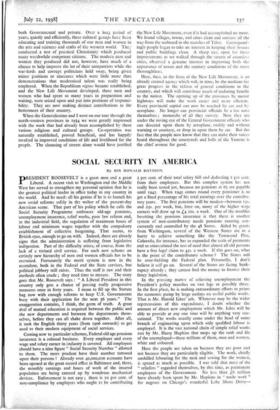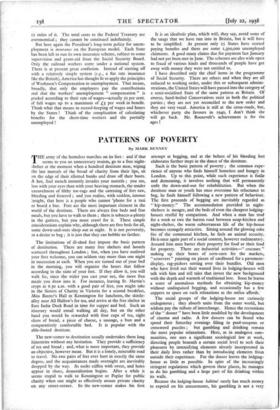SOCIAL SECURITY IN AMERICA
By SIR RONALD DAVISON
PRESIDENT ROOSEVELT is a great man and a great Liberal. A recent visit to Washington and the Middle West has served to strengthen my personal opinion that he is the greatest political leader in office today in any country in the world. And he needs all his genius if he is to launch his new social reforms safely in the welter of the present-day American scene. That part of his policy which he calls the Social Security Programme embraces old-age pensions, unemployment insurance, relief works, poor law reform and, in the industrial field, the regulation of maximum hours of labour and minimum wages together with the compulsory establishment of collective bargaining. That seems, to British eyes, enough to go on with. Indeed, there are already signs that the administration is suffering from legislative indigestion. Part of the difficulty arises, of course, from the lack of a' trained civil service. For each new scheme an entirely new hierarchy of men and women officials has to be recruited. Fortunately the merit system is now in the ascendant, both in the Federal and the State services, but political jobbery still exists. Thus the staff is raw and their methods often crude ; they need time to mature. The story goes that Mr. Roosevelt says : " A Liberal President in this country only gets a chance of passing really progressive measures once in forty years. I mean to fill up the Statute bag now with enough reforms to keep U.S. Governments busy with their application for the next 36 years." The exaggeration contains, I think, the germ of truth. A great deal of mutual education is required between the public and the new departments and between the departments them- selves, before they can all shake down together. After all, it took the English thirty years (from 1906 onwards) to get used to their modern equipment of social services.
Coming now-to particular schemes, Federal old age pensions insurance is a colossal business. Every employer and every wage and salary earner in industry is covered. All employees should have a nine figure " Social Security Number " allotted to them. The more prudent have their number tattooed upon their persons ! Already over 40,000,000 accounts have been opened at the great record office in Baltimore and, there, the monthly earnings and- hours of work of the insured population are being entered up by wondrous mechanical devices. Enforcement is not easy ; there is to per cent. of non-compliance by employers, who ought to be contributing 2 per cent. of their total salary bill and deducting 2 per cent. from their employees. But this complex system has not really been tested yet, because no pensions at 65 are payable until 1942. When 1942 comes round every pensioner is to get a fixed percentage of his total earnings over the contribu- tory years. The first pensions will be modest—between 15s. and 25s. per week, but, later on, many of the higher wage earners will draw up to L4 los. a week. One of the troubles besetting the pensions insurance is that there is another system of non-contributory needs pensions running con- currently and controlled by the 48 States. Aided by grants from Washington, several of the Western States are in a hurry to achieve something like the Townsend Plan. Colorado, for instance, has so expanded the scale of payments and so emasculated the test of need that almost all old persons have a free legal claim to 45s. a week. If this goes on, what is the point of the contributory scheme ? The States will be over-bidding the Federal plan. Personally, I don't believe it will go on. Several of the States are facing bank- ruptcy already ; they cannot find the money to finance their fancy legislation.
In the pressing matter of relieving unemployment the President's policy marches on two legs or possibly three. In the first place, he is making extraordinary efforts to prime the economic pump by large outlays on useful public works. That is Mr. Harold Ickes' job. Whatever may be the wider repercussions of this expenditure, I doubt whether the amount of direct new employment which Mr. Ickes will be able to provide at any one time will be anything very sen- sational. The works usually come under the head of some branch of engineering upon which only qualified labour is employed. It is the vast national chain of simple relief works run by Mr. Harry Hopkins that mops up the rank and file of the unemployed—three millions of them, men and women, white and coloured.
Here the people are taken on because they are poor and not because they are particularly eligible. The work, chiefly unskilled labouring for the men and sewing for the women, is spread as much as possible. I was told that most of the " reliefers " regarded themselves, by this time, as permanent employees of the Government. No less than L6 million have already been spent by Mr. Hopkins in " made work " for negroes on Chicago's wonderful Lake Shore Drive-- 12 miles of it. The total costs to the Federal Treasury are astronomical ; they cannot be continued indefinitely. - But here again the President's long-term policy for unem- ployment is insurance on the European model. Each State has been left to run its own insurance scheme, subject to some supervision and grant-aid from the Social Security Board. Only the railroad workers come under a national system. There is at present great confusion. Instead of starting off with a relatively simple system (e.g., a flat rate insurance like the British), America has thought fit to apply the principles of Workmen's Compensation to unemployment. That means, broadly, that only the employers pay the contributions and that the workers' unemployment " compensation " is graded according to their rate of wages—actually 5o per cent. of full wages up to a maximum of f3 per week in benefit. Think what that means in record-keeping of wages and hours by the States ! Think of the complication of calculating benefits for the short-time workers and the partially unemployed ! • It is an idealistic plan, which will, they say, avoid some of the 'snags that we have run into in Britain, but it will have to be simplified. At present only '25 States have started paying benefits and there are some 1,300,00o unemployed claimants. A good many claims due for payment last January had not yet been met in June. The schemes are also wide open to fraud of various kinds and thousands of people have got away with money they were not entitled to.
• I have described only the chief items in the programme of Social Security. There are others and when they are all reduced to working order, under this or subsequent admini- strations, the United States will have passed into the category of a semi-socialised State of the same pattern as Britain. Of course, hard-boiled Conservatives exist in both the political parties ; they are not yet reconciled to the new order and they are very vocal. America is still at the cross-roads, but, whichever party she favours in 1940, I don't think she will go back. Mr. Roosevelt's achievement is for the ages !












































 Previous page
Previous page